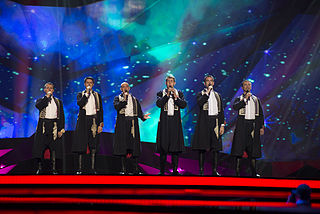The music of Croatia, like the divisions of the country itself, has two major influences: Central European, present in central and northern parts of the country including Slavonia, and Mediterranean, present in coastal regions of Dalmatia and Istria.

Željko Joksimović is a Serbian vocalist, composer, songwriter, multi-instrumentalist and producer. He plays 12 different musical instruments including accordion, piano, guitar and drums. Joksimović is multi-lingual, being fluent in Greek, English, Russian, Polish and French as well as his native Serbian.

Klapa music is a form of traditional a cappella singing with origins in Dalmatia, Croatia. The word klapa translates as "a group of friends" and traces its roots to littoral church singing. The motifs in general celebrate love, wine (grapes), country (homeland) and sea. Main elements of the music are harmony and melody, with rhythm very rarely being very important. In 2012 klapa was inscribed in UNESCO Intangible Cultural Heritage of Humanity.
Croatian Canadians are Canadian citizens who are of Croatian descent. The community exists in major cities including the Greater Toronto Area, Hamilton, Ottawa, Vancouver, Calgary, Edmonton, Winnipeg, Windsor, Montreal and Waterloo Region.
Mate "Mišo" Kovač is a Croatian recording artist. He is the best selling artist from Croatia and former Yugoslavia, with well over 20 million records, cassettes and compact discs sold to date, and is often regarded as one of the most popular musical performers from Southeastern Europe.

Hajrudin "Hari" Varešanović is a Bosnian musician. Known for his impassioned lyrical tenor vocals, distinct stage presence and specific brand of poetic lyrics, Varešanović remains the vocal soloist, primary composer and lyricist for the musical group Hari Mata Hari.
Bosnia and Herzegovina participated in the Eurovision Song Contest 2006 with the song "Lejla" written by Željko Joksimović, Fahrudin Pecikoza and Dejan Ivanović. The song was performed by the band Hari Mata Hari. Songwriter Željko Joksimović represented Serbia and Montenegro in the Eurovision Song Contest 2004 with the song "Lane moje" where he placed second in the grand final of the competition. On 9 February 2006, the Bosnian broadcaster Radio and Television of Bosnia and Herzegovina (BHRT) revealed that they had internally selected Hari Mata Hari to compete at the 2006 contest in Athens, Greece. Their song, "Lejla", was presented to the public during a show entitled BH Eurosong 2006 on 5 March 2006.

Hari Mata Hari is a Bosnian pop band. Hari Mata Hari is the stage name for the singer Hari Varešanović. The group originated from the city of Sarajevo, the capital of Bosnia and Herzegovina. The group has performed over 1,000 concerts and sold 5 million albums to date. Their songs are among the most famous and popular love ballads in the former Yugoslavia era. Hari Mata Hari was the representative of Bosnia and Herzegovina at the Eurovision Song Contest 2006 held in Athens, Greece. Coincidentally, hari mata hari in Malay stands for 'day of the sun, or Sunday'.
Popular music in Yugoslavia includes the pop and rock music of the former SFR Yugoslavia, including all their genres and subgenres. The scene included the constituent republics: SR Slovenia, SR Croatia, SR Bosnia and Herzegovina, SR Montenegro, SR Macedonia and SR Serbia and its subunits: SAP Vojvodina and SAP Kosovo. The pop and rock scene was a part of the general Music of Yugoslavia, which also included folk, classical music, jazz etc. Within Yugoslavia and internationally, the phrases ex-YU or ex-Yugoslav Pop and Rock both formally and informally generally to the SFRY period, though in some cases also to its successor the FR Yugoslavia including Serbia and Montenegro which existed until 2006.
City Records is a Serbian record label. Founded in 1997, the record label is part of the Pink Media Group. It is the home of some of the best selling Balkans pop artists.

Darko Dimitrov is a Macedonian songwriter, record producer, arranger and record executive. Highly acclaimed for revitalising the Yugoslav mainstream pop music scene, which also influenced the surrounding Balkan countries, he has received international recognition for working with many popular foreign artists.

Nenad N. Bach is a Croatian American recording artist, composer, performer, producer and peace activist. He has performed with a wide range of artists, including Luciano Pavarotti, Bono & The Edge (U2), Brian Eno, Garth Hudson & Rick Danko, Vince Welnick, John Malkovich, Ellen Burstyn, Martin Sheen and Michael York.

Klapa Šufit is a musical group from Split, Croatia.
Serbia participated in the Eurovision Song Contest 2012 with the song "Nije ljubav stvar" written by Željko Joksimović, Marina Tucaković and Miloš Roganović. The song was performed by Željko Joksimović, who had previously represented Serbia and Montentegro in the Eurovision Song Contest in 2004 where he placed second with the song "Lane moje". The Serbian national broadcaster, Radio Television of Serbia (RTS) internally selected the Serbian entry for the 2012 contest in Baku, Azerbaijan. Joksimović was announced as the Serbian representative on 18 November 2011, while the song, "Nije ljubav stvar", was presented on 10 March 2012 during a show titled Evropska pesma.
Croatia participated in the Eurovision Song Contest 2013 with the song "Mižerja" written by Goran Topolovac. The song was performed by the group Klapa s Mora, which was selected internally by the Croatian broadcaster Croatian Radiotelevision (HRT) on 11 February 2013 to represent Croatia at the 2013 contest in Malmö, Sweden. Their song "Mižerja" was presented to the public on 27 February 2013 during a live streamed press conference.

Klapa s Mora was a music ensemble that represented Croatia in the Eurovision Song Contest 2013 in Malmö with the song "Mižerja". It is a "super klapa" ensemble that includes six male klapa singers from five existing klapa groups in Croatia.
Tvoje lice zvuči poznato 1 was the first season of the Serbian reality contest based on the international franchise Your Face Sounds Familiar. It broadcast between October 12 and December 28, 2013. The judging panel consisted of late night talk show host Ivan Ivanović, singer and vocal coach Marija Mihajlović, actress Katarina Radivojević and a different guest judge each week. The series was hosted by Marija Kilibarda and actor Petar Strugar. The show's winner was singer Ana Kokić.
Hari Rončević is a Croatian pop singer and songwriter. He was born in Split, in former Yugoslavia.

The Bižuterija Tour was the first headlining solo concert tour by Croatian pop singer Jelena Rozga, in support of her second studio album, Bižuterija (2011). The tour began on 21 October 2010, in Zadar, Croatia, at the Krešimir Ćosić Hall and concluded on 9 November 2012, in Sarajevo, Bosnia and Herzegovina at the Skenderija. In addition to songs from the album, the set list of The Bižuterija Tour also featured songs from the Magazin era and from Rozga's debut studio album, Oprosti Mala (2006). The Bižuterija Tour was a critical and a commercial success; critics praised Rozga for her stage presence and energy and all concerts were sold out shortly after being announced. A documentary titled Hodam na prstima was released in 2011 that includes footage and recordings from concerts of the tour.








